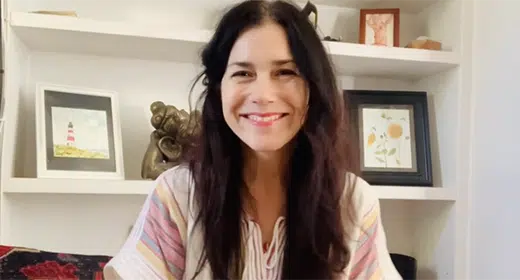My Take on OCD—
by Donna Quesada: Anybody can google a definition of OCD. But I think it would be more interesting to speak only from experience, so here goes… it’s when you care about something so much, that the mind gets stuck on anything that could possibly pose a threat to it, to the point that you will fabricate unlikely threats and blow any of them totally out of proportion. Then, in order to assuage the fear generated by that threat, you will try your damnedest to nullify it. And thus begins the annoying rituals.
It resembles phobia in many ways, but where phobia lies in the background most of the time, until the thing feared presents itself, OCD hijacks your thoughts and circles hyperbolic what-ifs around and around and then erects elaborate rituals, like fortress walls, meant to keep you safe, where there’s really no danger. And even though you know the danger is not real, your mind wants to “make sure,” just in case… so, it continues the rituals.
The most well-known form of this mechanism, thanks in part to Howie Mandel, is “Contamination OCD,” in which the fear of germs is so strong (because you care about your health so much), that you will go to any length to make sure there are no germs, including washing your hands again… and again… and again… just in case. But OCD can and does take many forms, including fear that you might accidentally harm someone you love, or fear that your work may not be properly submitted and in perfect order, to the point that you will continue to go over it… and over it… and over it.
I have written before, The Things I Learned about Sleep – Donna Quesada, about my particular form of it, which revolves around my sleep. But through the years, I’ve learned how to relax when the triggers pop up. Here’s what helps me most, to this day.
Surrender—
Because of the Bhakti element, which is so prevalent in Kundalini Yoga, I was able to surrender my fears and heal. Bhakti is typically called The Yoga of Devotion, but said more simply, it is when you drop down into your heart. When you put your mind in the backseat and allow yourself to be vulnerable, to feel, and to crumble on the inside. That is surrender.
The OCD mind doesn’t want to do that. Because the OCD mind is clever and it wants and needs to be in control. It is often said that people with OCD are intelligent. Yes, but more to the point, they have strong minds. Surrender is seen as weak. So, the OCD mind resists. Surrender lets go and OCD doesn’t want any part of it because something scary and bad might happen.
I experienced what surrender feels like when I first sat at my teacher’s feet. As corny as it sounds, something magical happened in that moment. I cried. I chanted and then I broke down. And after a regular practice of this, I started to heal, from the inside out, meaning organically… not because I was going head to head with OCD but because I let it all go and simply gave myself over to the practice.
Kundalini Yoga uses many tools to quiet overactive thoughts and relax the nervous system, such as sound healing and breath work. Together, with the Bhakti element, offered in the form of prayerful chanting, it was the perfect recipe for me. Many other traditions revolve around and emphasize Bhakti, in the form of prayer, which I fully encourage, as long as it is felt, and not just rote.
What about Detachment?—
Some secular traditions and philosophies emphasize only detachment, without the element of Bhakti, for example, Stoicism and some forms of Buddhism. As a philosopher and longtime Zen practitioner, I have experience with both. There is a place for the practice of detachment, which is a form of surrender. But I found that it’s a slightly different way of unlocking yourself. True Bhakti puts you metaphorically, in the fetal position, which is deeply healing on a level that mental detachment just doesn’t reach. In true surrender, you are metaphorically putting yourself in a cradle with an angel’s arms wrapped around you.
Do You Have to “Believe?”—
Does Bhakti require “religious belief?” It’s not like pregnancy, where you either are or you aren’t. It’s not like you believe or you don’t, in an absolute way, anyway. Because I don’t think anybody ever fully believes… That’s why you have faith. You choose to have faith. You lean toward erring on the side of possibility. So the answer is somewhere in between… maybe just believe a little bit. It’s in the spirit of, If you’re out there, please hold me.
But think about it… we live in that spirit with many things. For example, from the time we’re teenagers, we dream of finding true love. If only… Maybe he’s out there… There’s an openness there, but you don’t know for sure…
And it’s not just hope. Hope is too loaded. It’s active, it’s positive, it’s specific. Whereas Bhakti is humble. Bhakti is when you surrender to the unknown. When you surrender, you resist nothing. And this is key for OCD because resistance is the very fuel that drives the mental ruminations and compulsions. As an OCD sufferer, you live your life resisting any and all triggers… fighting against every possible threat. Resistance is the name of the game with OCD. Surrender is when you lay down your sword and stop doing battle. You stop trying to figure it out. You give up on the certainty of safety.
But love and divine protection take its place. Bhakti opens the heart. And in so doing, we float up and out of our identification with the mental machinations. We are now oriented toward the beloved… whoever and whatever that means to you. The lower stuff of the mind shrinks down of its own accord. It becomes so small, and so meaningless in comparison. And then you’re free…









































